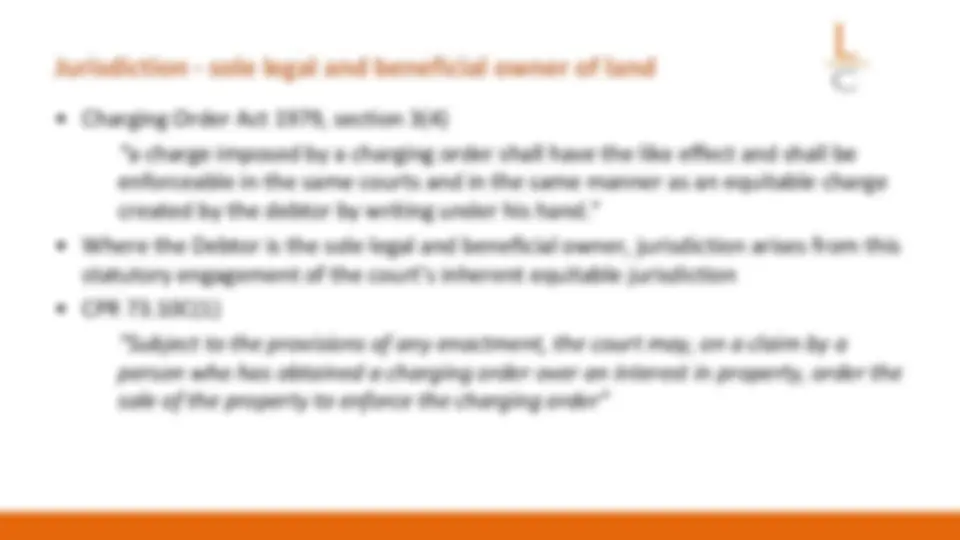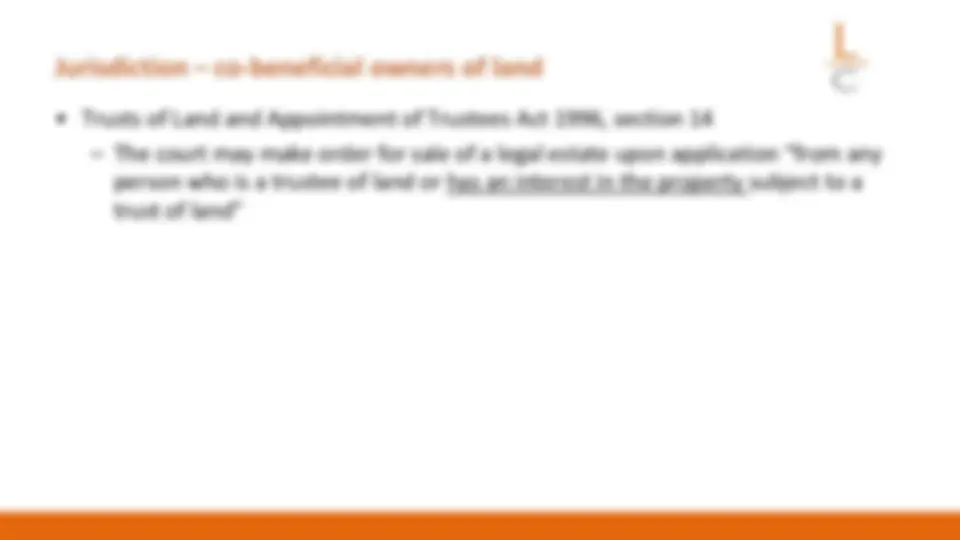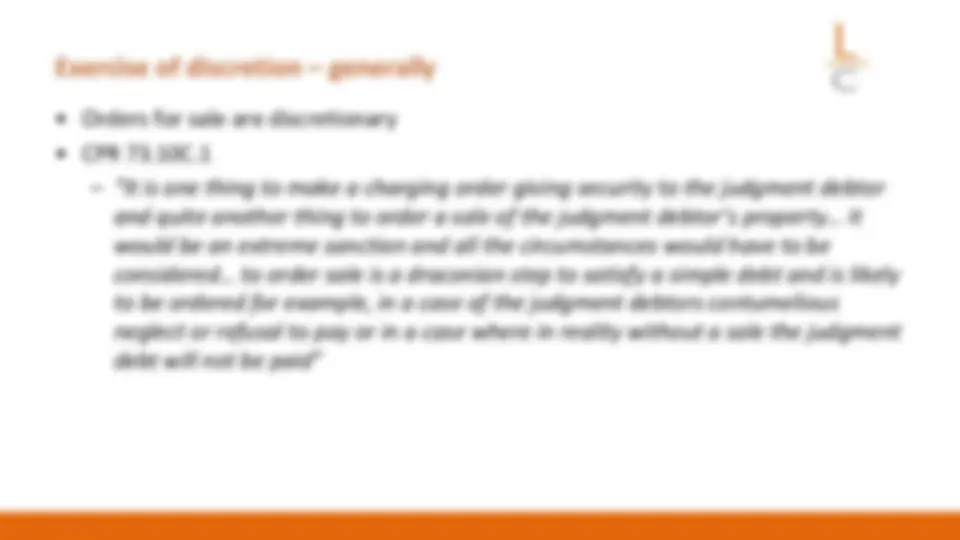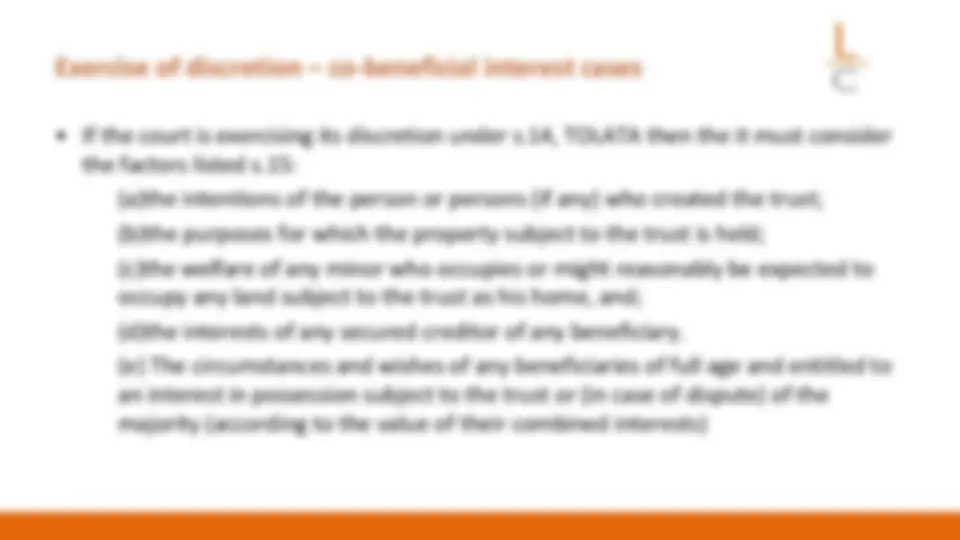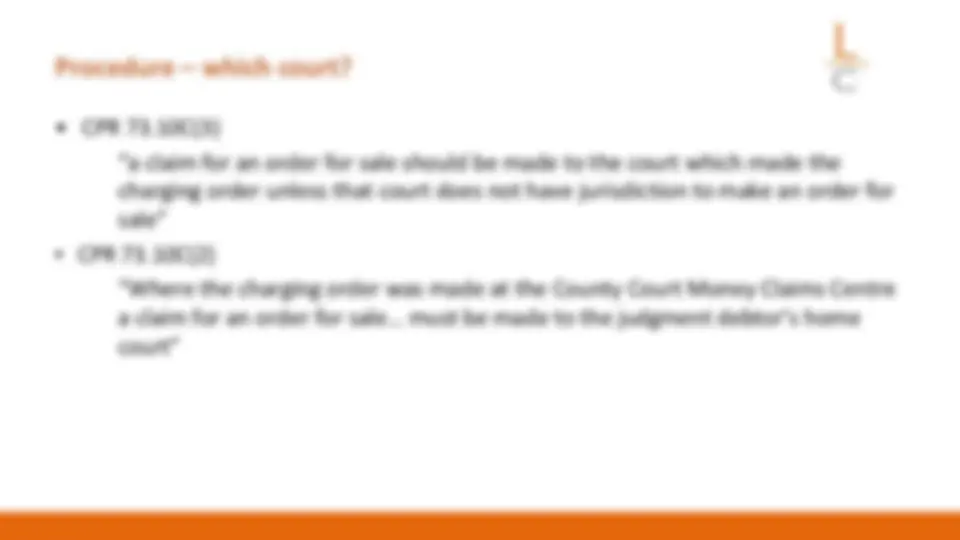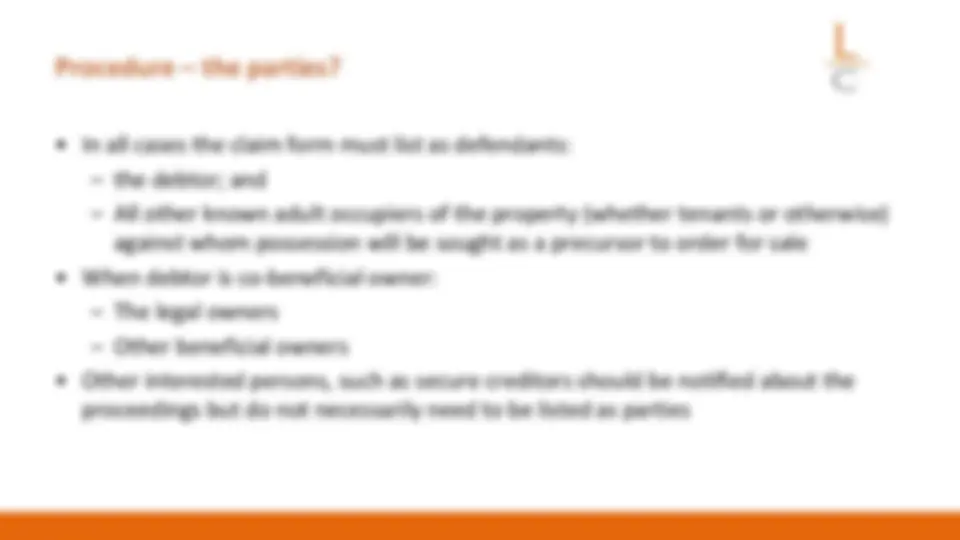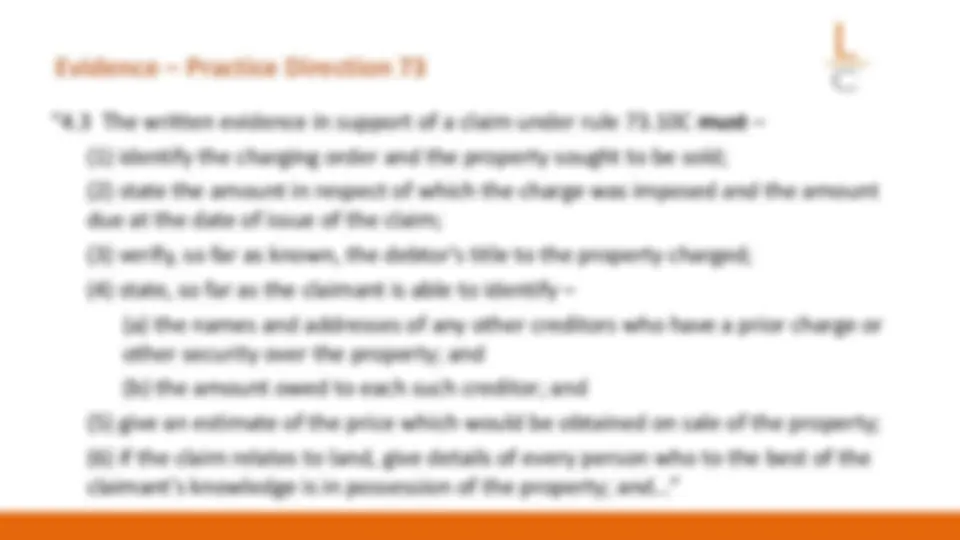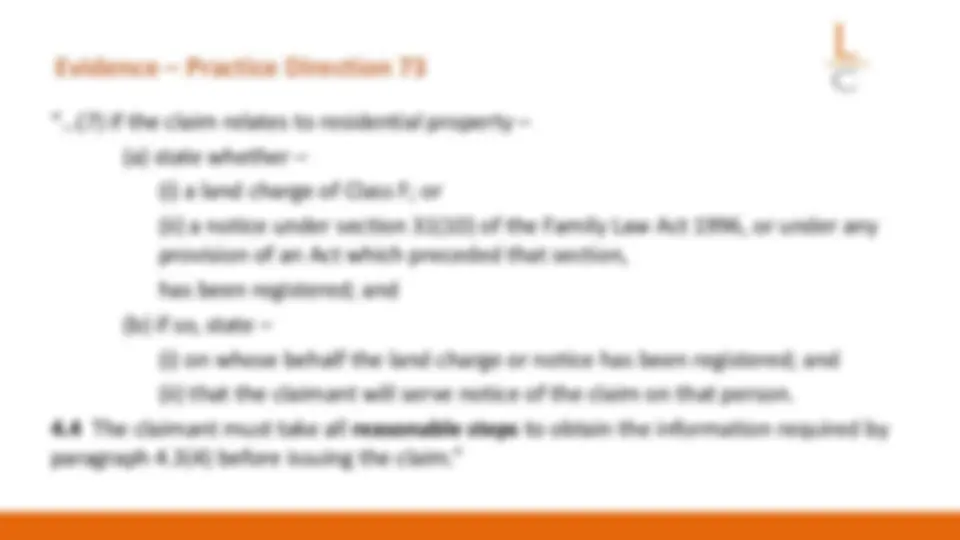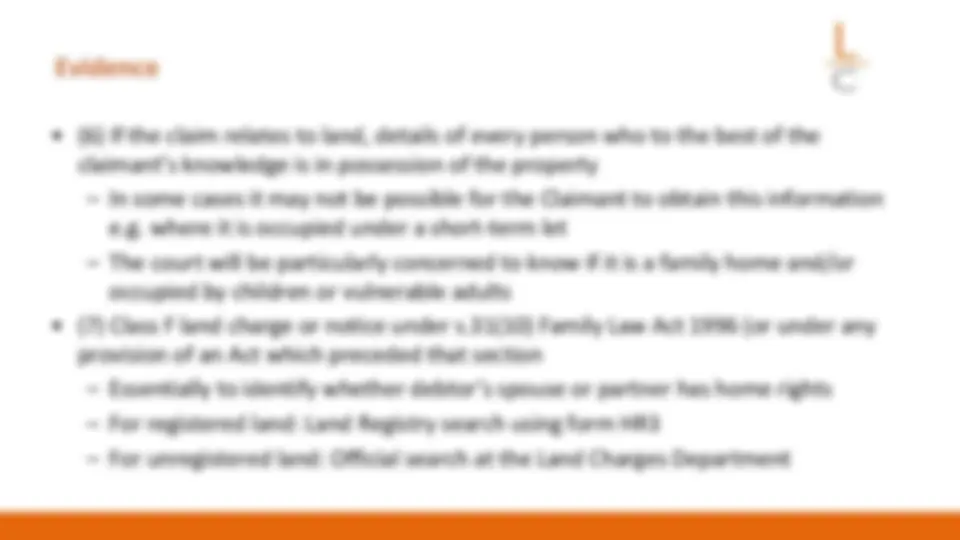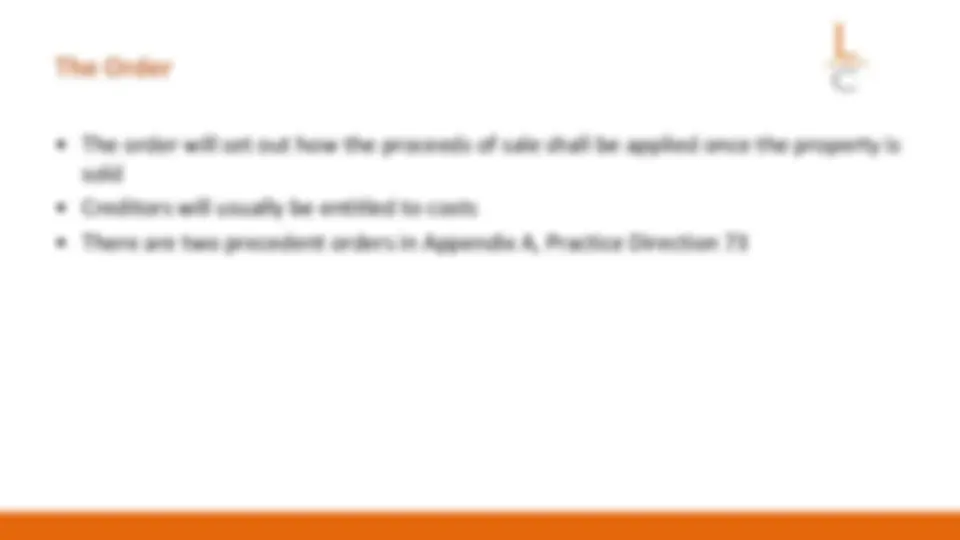Download Orders for Sale and more Schemes and Mind Maps Finance in PDF only on Docsity!
Orders for Sale
Brooke Lyne
Introduction
- What is an order for sale?
- Why might you want one?
Jurisdiction – co-beneficial owners of land
- Trusts of Land and Appointment of Trustees Act 1996, section 14
- The court may make order for sale of a legal estate upon application “from any person who is a trustee of land or has an interest in the property subject to a trust of land”
Exercise of discretion – generally
- Orders for sale are discretionary
- CPR 73.10C.
- “It is one thing to make a charging order giving security to the judgment debtor and quite another thing to order a sale of the judgment debtor’s property… it would be an extreme sanction and all the circumstances would have to be considered… to order sale is a draconian step to satisfy a simple debt and is likely to be ordered for example, in a case of the judgment debtors contumelious neglect or refusal to pay or in a case where in reality without a sale the judgment debt will not be paid”
Exercise of discretion – generally
- Attitude of debtor towards paying the debt and conduct to date
- The prospects of the debt being paid without an order for sale
- Ratio of debt to the value of the charged asset
- “no rules or presumptions” ( Packman Local v Mentmore [2010] EWHC 1037 (TCC)
- The attitude of other secured creditors
Exercise of discretion – co-beneficial interest cases
- If the court is exercising its discretion under s.14, TOLATA then the it must consider the factors listed s.15: (a)the intentions of the person or persons (if any) who created the trust; (b)the purposes for which the property subject to the trust is held; (c)the welfare of any minor who occupies or might reasonably be expected to occupy any land subject to the trust as his home, and; (d)the interests of any secured creditor of any beneficiary. (e) The circumstances and wishes of any beneficiaries of full age and entitled to an interest in possession subject to the trust or (in case of dispute) of the majority (according to the value of their combined interests)
Procedure – which court?
• CPR 73.10C(3)
“a claim for an order for sale should be made to the court which made the charging order unless that court does not have jurisdiction to make an order for sale”
- CPR 73.10C(2) “Where the charging order was made at the County Court Money Claims Centre a claim for an order for sale… must be made to the judgment debtor’s home court”
Procedure – which court?
- County Court:
- Where judgment debt is no more than £350,
- High Court
- Where judgment debt exceeds £350,
- Should be brought in Chancery Division (but, see Packman Lucas v Mentmore Towers [2010] EWHC 1037 (TCC))
Procedure – the parties?
- In all cases the claim form must list as defendants:
- the debtor; and
- All other known adult occupiers of the property (whether tenants or otherwise) against whom possession will be sought as a precursor to order for sale
- When debtor is co-beneficial owner:
- The legal owners
- Other beneficial owners
- Other interested persons, such as secure creditors should be notified about the proceedings but do not necessarily need to be listed as parties
Evidence – Practice Direction 73
“4.3 The written evidence in support of a claim under rule 73.10C must – (1) identify the charging order and the property sought to be sold; (2) state the amount in respect of which the charge was imposed and the amount due at the date of issue of the claim; (3) verify, so far as known, the debtor's title to the property charged; (4) state, so far as the claimant is able to identify – (a) the names and addresses of any other creditors who have a prior charge or other security over the property; and (b) the amount owed to each such creditor; and (5) give an estimate of the price which would be obtained on sale of the property; (6) if the claim relates to land, give details of every person who to the best of the claimant's knowledge is in possession of the property; and…”
Evidence
- (1) Identify the charging order and property sought to be sold
- Covered in witness statement and copy of title (if available)
- (2) State the amount in respect of which the charge was imposed and the amount due at the date of issue of the claim - Calculate judgment interest on the principal debt and any costs
Evidence
- (3) Verify, so far as known the debtor’s title to the property charged
- In most cases land will be registered, so an official copy entry of title will be enough
- Where land is unregistered, then the title deeds may be required
- Further evidence of a beneficial interest (e.g. trust deed, witness statement, etc.)
Evidence
- (6) If the claim relates to land, details of every person who to the best of the claimant’s knowledge is in possession of the property - In some cases it may not be possible for the Claimant to obtain this information e.g. where it is occupied under a short-term let - The court will be particularly concerned to know if it is a family home and/or occupied by children or vulnerable adults
- (7) Class F land charge or notice under s.31(10) Family Law Act 1996 (or under any provision of an Act which preceded that section - Essentially to identify whether debtor’s spouse or partner has home rights - For registered land: Land Registry search using form HR - For unregistered land: Official search at the Land Charges Department
The Order
- Most orders are conditional or suspended to give the debtor one final opportunity to satisfy the debt before the property is sold
- The order will usually make provision for the property to be sold for a sum not less than £X - The Claimant can apply back to reduce this figure if necessary
- The order will usually make provision for the practical aspects of the sale e.g. conveyancing solicitors to be appointed
- The order will usually include a possession order requiring the occupiers to leave before a certain date

